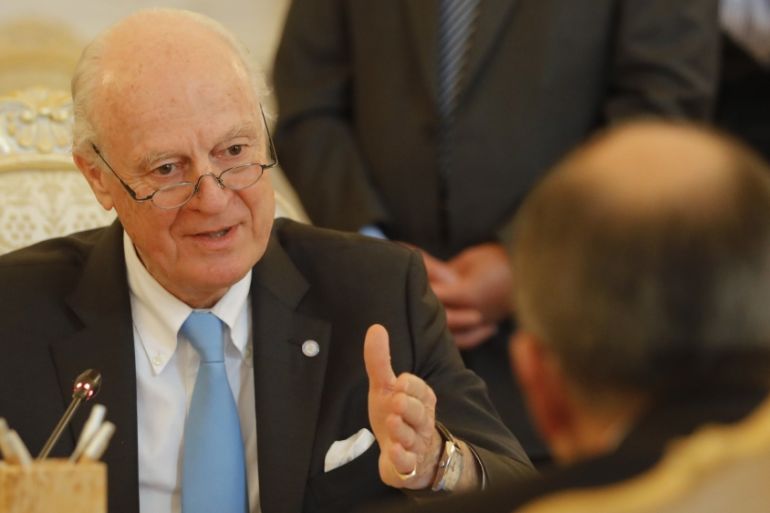Staffan de Mistura calls for de-escalation in Syria
Special envoy issues appeal during visit to Moscow as inspectors wait for access to suspected gas attack site in Syria.

The UN special envoy for Syria has said tensions need to calm down between the major global powers in order to restart diplomatic efforts to end the conflict in Syria.
Staffan de Mistura made the comments after holding talks on Friday with Sergey Lavrov, Russia’s foreign minister, in Moscow.
Keep reading
list of 4 itemsThe Take: Thirteen years later, has the world forgotten Syria?
Jordan army kills drug runners at Syria border amid soaring Captagon trade
Assad arrest warrant: ‘Hope and pain’ for Syrian chemical attack survivors
De Mistura said that chemical weapons inspectors in Douma, Syria, should do their job as quickly as possible and without any interference.
“We need a political de-escalation, not only a military de-escalation, and I think that would be possible with further discussions,” he said.
De Mistura said he was pleased to hear that there is a “strong commitment” from Russia to the political process.
The meeting in Moscow follows a difficult and tense week between the US and Russia after the US and allies launched air strikes in the early hours of April 14, hitting three targets in Syria associated with its chemical weapons programme.
Russian denial
The attacks were described as retaliation for a suspected chemical attack in Douma, a town in Eastern Ghouta, on April 7 that killed at least 70 people.
Syria and its ally Russian have denied using toxic gas in the assault on Douma.
Al Jazeera’s Rory Challands, reporting from Moscow on Friday, said it might be difficult for diplomatic efforts to occur under the current circumstances.
|
|
“It’s been a long time since Geneva last made any significant progress, and we now have a situation where we have credible accounts of chemical weapons being used in Syria,” he said.
“We have geopolitical tension levels pretty high at the moment between the US and Russia. And we also have a situation in Syria where Russia, the US, Turkey and Iran are all vying for territorial spheres of influence.
“Getting all of these different factions around the table working towards a long-term settlement for Syria looks as hard now as it has ever been.”
For his part, Lavrov, speaking at a joint press conference in Moscow with his Austrian counterpart on Friday, said Russia would not accept attempts at dividing Syria and creating a permanent presence of foreign forces in the country.
“There is Resolution 2254 of the UN Security Council, under which Syria should be united and undivided and the political process should enable Syrians to define their fate without foreign interference,” Lavrov said.
“All our steps are aimed at achieving this result.”
Gains by government
Lavrov’s comments came as inspectors from the Organisation for the Prohibition of Chemical Weapons (OPCW) were reportedly still waiting to visit the site of the suspected gas attack in Douma after arriving in Syria nearly a week ago.
Russia has denied US accusations that it is trying to delay the international inspectors’ arrival at the site, which is now controlled by Syrian government forces.
Syrian President Bashar al-Assad is in his strongest position since the start of the war seven years ago.
|
|
Government forces have been steadily regaining more territory from the opposition.
On Thursday rebels surrendered their arms and abandoned the town of Dumayr, northeast of Damascus, after agreeing to be moved to rebel-held territories in northern Syria under an evacuation deal.
The remaining rebel factions in nearby eastern Qalamoun have also agreed to surrender without a fight under threat of military action by Syrian government forces.
The enclave is a strategic location for the Syrian government as it lies along the main highway between Damascus and Baghdad.
Al Jazeera’s Zeina Khodr, reporting from Beirut in neighbouring Lebanon, said Syrian government forces have been using the threat of military action to bring about a surrender by rebel groups.
“The government is using this tactic as well with rebels in the northern countryside of Homs, telling them that you can face what the rebels of Eastern Ghouta faced if you don’t agree to lay down your arms,” she said.
A ceasefire is in place and negotiations are set to continue on Sunday.